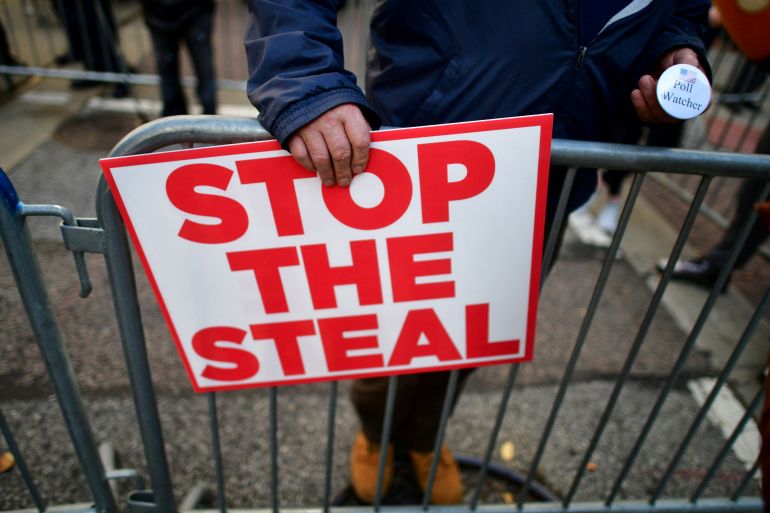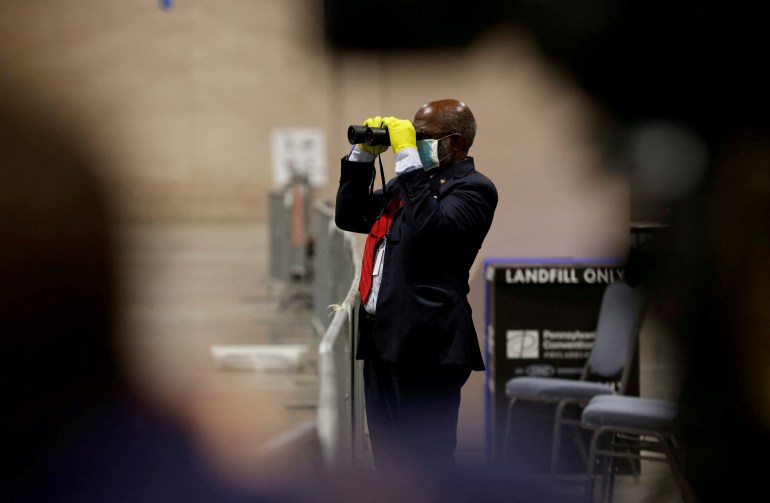‘Stop the steal’ poll watchers spark concern before US midterms
A growing grassroots effort, led by prominent election deniers, has piqued worries of disruptions before November 8.

Officials gathered at the El Paso County clerk’s office in the US state of Colorado in July to recount votes in the state’s Republican primary vote.
They were met by dozens of angry election watchers pounding on the windows, at times yelling at workers and recording them with mobile phones, according to the county’s Republican clerk Chuck Broerman.
Keep reading
list of 3 items‘They aren’t watching’: January 6 panel fails to sway GOP voters
US midterms: Trump-backed candidates win, lose in primaries
In the hallway, a group prayed for “evil to descend” on the “election team”, Broerman said. “It’s astonishing to me to hear something like that.”
As the United States enters the final stretch before November’s midterm elections, the Reuters news agency has documented multiple incidents of intimidation involving an expanding army of election observers, many of them recruited by prominent Republican Party figures and activists echoing Trump’s false theories about election fraud and continuing his rallying call to “Stop the steal.”
Interviews with more than two dozen election officials, as well as representatives of groups driven by false theories about election fraud and an examination of poll-watching training materials, revealed an intensifying grassroots effort to recruit activists.
The trend has heightened alarm that disturbances in this year’s primary contests could foreshadow problems in November’s local, state and national races, deepen distrust about the US election process and lead to further harassment and threats to already besieged election workers.
Election officials in three other states – North Carolina, Arizona and Nevada – reported similar incidents in recent months.
In 16 North Carolina counties alone, officials noted unusually aggressive observers during May’s primary elections, according to a state election board survey.

Some attempted to take photographs of sensitive voting equipment or intimidated voters at polling places, in violation of North Carolina’s election laws.
During early voting in Arizona’s Pima County, an election observer was told to put away binoculars. Another was caught looking at private voter data, and another was asked to stop making comments about “fraudulent elections”, according to a September report by the county recorder’s office reviewed by Reuters. Arizona state law forbids voter intimidation and obstructing election workers.
Pima county recorder Gabriella Cazares-Kelly said her election staff received multiple complaints from voters that individuals were shouting at them from outside the 75-foot circumference around polling stations, where interaction with voters is banned.
“The concern is it makes them feel unwelcome,” said Cazares-Kelly.
In Nevada’s Washoe County, people with night vision goggles stood outside the registrar’s building and aimed their cameras at election workers counting votes on primary night in June, two Washoe County officials told Reuters.
While poll watchers have been a feature of American democracy since the 18th century, recruited by parties and candidates and regulated by state laws and local rules, the recent incidents in the wake of the 2020 elections have caused disquiet. Poll watchers from both parties have historically visited polling sites to keep an eye on the voting – and each other – to make sure things went smoothly.
“It’s a real concern,” said Al Schmidt, a former Philadelphia city commissioner who received death threats after the 2020 election for refuting false claims of voter fraud. “If these people show up to the polls with the intention of disrupting voting from taking place, then I can’t imagine a worse threat to democracy than that.”
In some places, poll “watchers” are different from “challengers”, who can point out people they suspect are not legal voters. In other states, poll watchers also do the challenging.
Sandy Kiesel, who heads the Election Integrity Force in Michigan, maintained her poll “challengers” will be trained to be “polite, respectful and to obey the law”.
“We’re not about trying to hassle poll workers,” Kiesel told Reuters. “It’s about transparency. If we can all see what’s going on, maybe we wouldn’t have these arguments whether elections are free and fair.”
Republican support
For its part, the Republican Party said it welcomes volunteers from many different groups, expects them to respect the law, and to follow the party’s training.
The Republican National Convention has poured resources into recruiting observers and workers since being freed from the restrictions of a court-ordered consent decree in 2018.
It expects to have trained more than 52,000 poll watchers and workers between November last year and the coming election, saying comparative numbers for past elections were unavailable.
“Our program is independent of anything else,” said RNC spokesperson Danielle Alvarez.
The consent decree, which sharply limited the party’s ability to challenge voters’ qualifications, was put in place after the RNC, during a 1981 governor’s race in New Jersey, engaged in intimidation tactics targeted at minority voters.
A spokesman for the Democratic National Committee said they did not have a national number because state party offices manage their poll watcher recruitment.
But the DNC said it has hired five staffers to work in North Carolina, Wisconsin, Nevada, Arizona and Texas to counter efforts to subvert the electoral process, including ballot counting and the certification of results.
In North Carolina’s rural Henderson County, as voters cast ballots in May’s primary elections, aggressive groups turned up.
Observers demanded to inspect voting machine tabulators in violation of state election laws.
Others repeatedly grilled poll workers or demanded to take pictures inside voting stations. When told to stop, they said they were following guidance from a Republican Party lawyer, said Henderson County Election Director Karen Hebb.
“It was stressful,” she said. “If we refused to let the observers do something, they said, ‘You know you can be sued if you don’t allow us.'”
Some of the Republican observers later identified themselves as members of the North Carolina Election Integrity Team, a group linked to a nationwide effort led by lawyer Cleta Mitchell, a longtime Republican election lawyer and promoter of voter fraud theories who joined Trump’s legal team in his effort to overturn the result of the 2020 elections.
As head of the Election Integrity Network, Mitchell is training election observers and is trying to build grassroots networks of conservatives in advance of the midterms. In the first six months of 2022, her network hosted a series of training sessions for activists in Michigan, Pennsylvania, Wisconsin, Virginia, North Carolina, Georgia, Florida and Arizona.
Although Mitchell and other activists said the effort is nonpartisan, the project is funded by the Conservative Partnership Institute, a Washington nonprofit organisation with deep ties to Trump’s political network.
Mark Meadows, Trump’s former chief of staff, is listed as the organisation’s “senior partner”.
Trump’s political action committee, Save America, gave the group $1m in 2021, campaign finance records show. Meadows and Mitchell did not return requests for comment from Reuters.